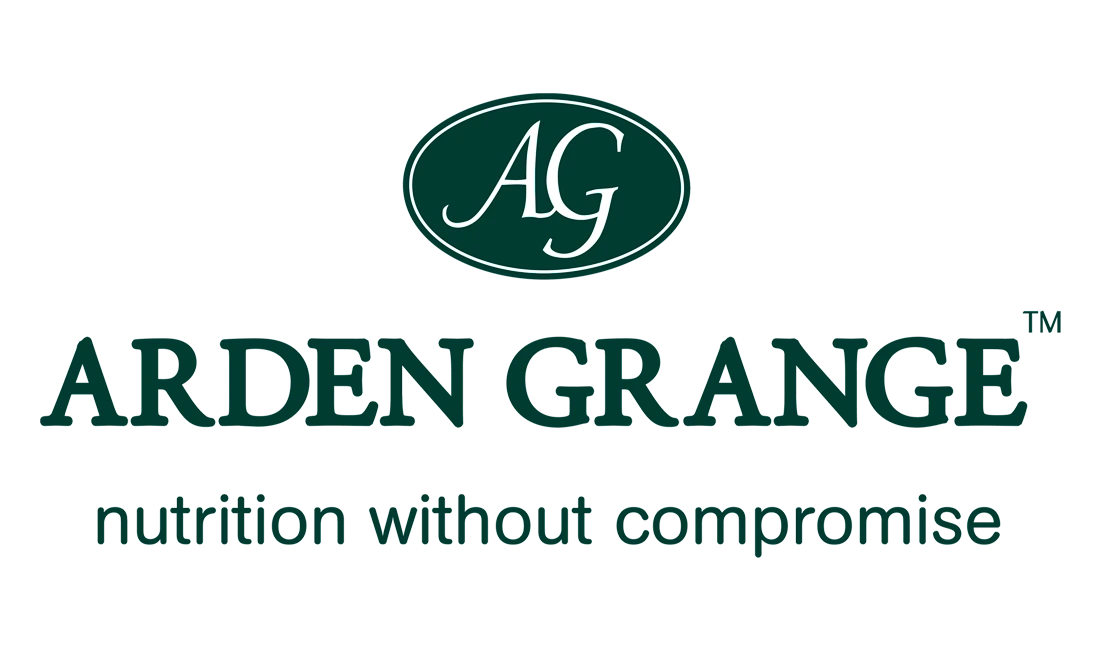ingredient glossary |
We have many enquiries from customers wanting to know more about the ingredients in Arden Grange pet foods. For this reason, we have put together a menu that summarises the nutrients in our diets and outlines the benefits to the health and well-being of your much loved canine and feline companions. For ease of reference, the ingredients are listed in alphabetical order.
Ash is included in the glossary because of the common misconception that it is an ingredient. It is a measurement of the non-combustible material in the food which is left after burning, and indicates the total mineral content. All pet food labels must declare the ash content, but sometimes it is listed as “inorganic matter”.
Beet pulp is an excellent source of both soluble and insoluble fibre. Soluble fibre is used for the production of short-chain fatty acids (which supply energy to the friendly bowel flora). It delays gastric emptying, so there is more time for absorption, and improves peristalsis (the contractions that move the food along the digestive tract). Insoluble fibre ensures an optimal transit time of food within the intestine, dilutes the colonic contents and binds to toxins, helps promote the right consistency of stool, and it may aid dietary satisfaction. Beet pulp is not a common allergen because it does not contain very much protein, nor does it turn the coat red.
See also: Prebiotic FOS and Prebiotic MOS
Carrots are a good source of fibre, plus many vitamins and minerals including vitamin A, vitamin B1, vitamin B3, vitamin B6, folic acid, vitamin C, vitamin K, manganese and potassium.
Chondroitin blocks destructive enzymes that break down cartilage in the joint. There is always a low level of these destructive enzymes in the joint, but when injury or abnormal wear occurs, these enzymes multiply. Our chondroitin is derived from poultry.
See also: Glucosamine
Corn (maize) is a complex carbohydrate which is a good source of energy, and nutrients including vitamin B3, vitamin B5, vitamin B6, manganese, phosphorous and fibre. Sweetcorn kernels are indigestible when fed raw, but when cooked within an extruded pet food, the digestibility exceeds 85%. Corn is a gluten free grain.
See also: Rice (Wholegrain White)
Cranberries are included for urinary support. They contain D-mannose and hippuric acid, which prevent harmful bacteria from sticking to the mucosal walls. They also contain arbutin, which is effective against certain bacteria and fungi, including Candida. The antioxidant and antiviral properties of cranberries further illustrate the versatility of this small but valuable fruit.
Gelatin is used to thicken our Tasty Liver Treat and it is a naturally derived vegetable source
Glucosamine provides the building blocks to synthesise new joint cartilage, and together with chondroitin and MSM may support joint mobility and longevity. Our glucosamine is derived from crustacean shells.
See also: Chondroitin and MSM
Grape seed extract is a source of oligomeric proanthocyanidins which have antioxidant properties and complement vitamin C, enhancing its effect. Antioxidants are important because they help to protect the body against the harmful effects of free radicals. Grape flesh is toxic to some animals, but the extract from the seed is not associated with any harmful side-effects.
Green tea extract (from the plant Camellia sinensis) is a source of antioxidants called catechins which provide support to the immune and cardiovascular systems.
Krill are crustaceans similar to very small shrimps. Krill meal is a superior and outstandingly pure source of the omega-3 fatty acids EPA and DHA which have many recognised health benefits, and are important to the nervous system, heart and eyes as well as many other cells, tissues and organs in the body. EPA and DHA's anti-inflammatory properties are also well documented.
Krill meal is extra special since it contains omega-3 fatty acids that are bound to phospholipids (rather than triglycerides); a form which ensures that tissue uptake is particularly effective. The presence of choline is beneficial since this nutrient supports cell structure and function, gene regulation and fat metabolism. Astaxanthin is also contained within krill meal, and this has very powerful antioxidant and anti-inflammatory properties (to help neutralise free radicals). Krill meal is also a very nutritionally valuable source of protein with an excellent essential amino acid profile.
For more information about this ingredient read our fact sheet.
L-carnitine plays an important role in the production of energy by transporting fatty acids to the mitochondria (the “energy packs” of the cells). It may increase fat metabolism in the skeletal and cardiac muscle, and improve stamina. Although it is naturally present in meat, fish and egg, our recipes formulated for dogs that may benefit from increased levels have an L-carnitine supplement added.
Linseed (flax) is a good source of fibre, omega-3 fatty acids and lignans (which have antioxidant properties). It is rich in vitamins and minerals including vitamin B1, vitamin B3, manganese, magnesium, phosphorous and copper. Linseed contains lignans, which are a class of phytoestrogens considered to have antioxidant properties.
MSM (methyl-sulphonyl-methane) is a form of organic sulphur derived from pine bark, and its beneficial properties may include the relief of pain and inflammation. It is also thought that MSM may improve mental alertness and relieve stress.
Nucleotides are derived from a special type of nutritional yeast. They increase the surface area for the absorption of nutrients within the small intestine, which may improve the efficiency of the digestion. Nucleotides also support immunity as they help the defence cells to replicate more quickly when challenged; e.g. by infectious organisms.
Parsley is a herb that is rich in vitamins, folate and iron.
Peas are a good source of vitamin K1, folic acid and vitamin B6, and are included in the Arden Grange Partners canned foods. Pea starch and pea fibre are used as a grain-free carbohydrate source and fibre source respectively in our feline dry food range.
Potato is a very digestible carbohydrate source, and it is rich in vitamin c, vitamin B6 and potassium. It is often an ideal alternative carbohydrate source for animals known or suspected to be allergic or intolerant to grains.
Potato protein is used in the Sensitive Puppy / Junior recipe (in conjunction with animal sources – white fish, egg and krill) to ensure a suitable protein content without overly high mineral levels.
Prebiotic FOS (fructo-oligosaccharides) are derived from the chicory plant. This type of prebiotic can only be broken down by the friendly gut bacteria, and when this takes place, the energy that is produced is utilized by the beneficial flora and enables them to reproduce efficiently. A thriving colony of the good gut bacteria may limit the growth of pathogenic bacteria.
Prebiotic MOS (manno-oligosaccharides) are derived from yeast. This type of prebiotic acts as a gut security guard, mopping up pathogenic organisms and helping to transport them out of the body.
Quercetin is a water-soluble plant pigment. The ingredient we use is derived from citrus fruits including oranges. It is a powerful antioxidant and thought to have anti-inflammatory properties.
Rice is a very digestible energy source and usually very well tolerated. We use white rice rather than brown because there are already effective fibre and B vitamin sources in our products. Rice contains little protein and is therefore not commonly associated with food allergies. It contains resistance starch which helps to feed the friendly gut bacteria.
Rosemary extract is used as a natural preservative and it helps prevent the oxidisation of the fat components of the food. It is deodorised, and there are no studies to suggest that it causes or exacerbates seizures.
Seaweed extract contains many phytochemicals, vitamins and minerals including iodine. Iodine is necessary for efficient cell respiration, nerve and muscle functioning, the growth and repair of tissues, and it helps to promote healthy skin, hair, teeth, and nails. Seaweed extract is included in the Arden Grange Partners canned food range.
Sunflower oil is rich in vitamin E and linoleic acid.
Sweet potato is a good source of carbohydrate for the provision of energy. It is an excellent source of many vitamins and minerals including vitamin A (in the form of beta-carotene), vitamin C, manganese, copper, pantothenic acid and vitamin B6.
Taurine is an essential nutrient for cats because they cannot manufacture it themselves, and therefore it is added to our feline range. Taurine is especially important for healthy vision, reproduction and cardiovascular function. The Arden Grange Performance contains a taurine supplement since active, working and sporting dogs may benefit from a higher level to support the heart muscle. It is also included in our Sensitive dry range for dogs.
Tocopherols (vitamin E) are used as an antioxidant along with rosemary extract to help preserve the dry products naturally and prolong their shelf life.
Yeast / malt extract is a rich source of B vitamins, and animals like the umami flavour. We use nutritional yeast which is an inactivated type rarely associated with allergic responses. Animals that have yeast allergies normally are reactive to the pathogenic yeasts growing on or inside of their bodies or to active yeasts like those used for baking bread.
Yucca extract is derived from sap which has been extracted from the yucca schidigera cactus. All our dry diets are supplemented with yucca extract since it may help reduce faecal odour and reduce lawn staining.


 Puppy
Puppy
 Adult
Adult
 Senior
Senior
 Sensitive
Sensitive
 Treats
Treats Kitten
Kitten
 Adult
Adult
 Senior
Senior
 Trusted British Brand
Trusted British Brand

